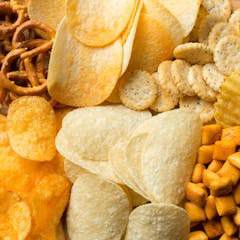
Articles on Salt
Displaying 1 - 20 of 63 articles

The mass-produced wholegrain bread you buy from the supermarket isn’t harmful to your health, even though it’s an ‘ultra-processed’ food. Your overall diet matters more.

Salt is an essential nutrient that has helped civilizations flavor and preserve their foods for millennia. Too much dietary salt, however, is linked to a host of health problems.

You might be surprised how salty or fatty some plant-based foods are. Not so healthy now, are they?

Western Australia has introduced a limit on ham in school canteens. Here’s what has changed and the evidence it’s based on.

Dogs might have furry coats, but they can still get cold when the temperature drops.

Potassium-enriched salt tastes like regular salt and you don’t need to change how you cook or season your food. You just need to switch the type of salt you buy.

A new study suggests that adding salt to your food at the table is linked to an increased risk of type 2 diabetes. But caution is needed.

Eating too much salt is bad for our health. Governments and food manufacturers have a big role to play in reducing the salt content of Australians’ diets.

Ultra-processed foods are bad for our health and our planet and must be central to any efforts to reduce our carbon emissions, and waistlines.

Bread may be defined as an ‘ultra-processed food’ – but that doesn’t mean you need to stop eating it.

Although it has been considerably less studied than other environmental problems, salinization presents major challenges for biodiversity in freshwater and coastal areas.

Fifty years ago, the Salton Sea was a draw for boaters and fishermen; today it’s an ecological time bomb. Two water experts who served on a state review panel describe its proposed rescue plan.

Looking to save money on your grocery bill but not sure about home-brand food? It’s actually a healthy option, with a few exceptions.

We all know we should reduce our salt intake, but can you remember why? Knowing might help you cut back.

A new study questions whether current global salt limits are too low. But don’t reach for the salt just yet – the guidelines are unlikely to change any time soon.

Following a healthy diet may lower the risk of disease complications and allow patients to live well despite having the disease.

De-icing salts help us get around in winter, but they corrode cars, crack roads and contaminate rivers and lakes. Scientists are working to develop better options by imitating natural antifreezes.

All the fluids in our bodies have a little bit of salt in them.

Everyone knows it’s hard to stop eating potato chips or chocolate chip cookies. New research shows why: Certain combinations of fat, sodium, sugar or carbohydrates make them irresistible.

Pizza might seem like a simple food, but it’s uniquely equipped to excite our brains and thrill our taste buds.
